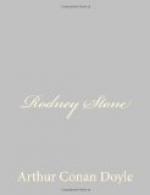Of all the amazing things which had happened, this seemed to have impressed my uncle most, and he recurred to it again and again. That a man whom he had come to regard as a machine for tying cravats and brewing chocolate should suddenly develop fiery human passions was indeed a prodigy. If his silver razor-heater had taken to evil ways he could not have been more astounded.
We were still a hundred yards from the cottage when I saw the tall, green-coated Mr. Corcoran striding down the garden path. My father was waiting for us at the door with an expression of subdued delight upon his face.
“Happy to serve you in any way, Sir Charles,” said he. “We’ve arranged it for to-morrow at seven on Ditching Common.”
“I wish these things could be brought off a little later in the day,” said my uncle. “One has either to rise at a perfectly absurd hour, or else to neglect one’s toilet.”
“They are stopping across the road at the Friar’s Oak inn, and if you would wish it later—”
“No, no; I shall make the effort. Ambrose, you will bring up the batteris de toilette at five.”
“I don’t know whether you would care to use my barkers,” said my father. “I’ve had ’em in fourteen actions, and up to thirty yards you couldn’t wish a better tool.”
“Thank you, I have my duelling pistols under the seat. See that the triggers are oiled, Ambrose, for I love a light pull. Ah, sister Mary, I have brought your boy back to you, none the worse, I hope, for the dissipations of town.”
I need not tell you how my dear mother wept over me and fondled me, for you who have mothers will know for yourselves, and you who have not will never understand how warm and snug the home nest can be. How I had chafed and longed for the wonders of town, and yet, now that I had seen more than my wildest dreams had ever deemed possible, my eyes had rested upon nothing which was so sweet and so restful as our own little sitting-room, with its terra-cotta-coloured walls, and those trifles which are so insignificant in themselves, and yet so rich in memories—the blow-fish from the Moluccas, the narwhal’s horn from the Arctic, and the picture of the Ca Ira, with Lord Hotham in chase! How cheery, too, to see at one side of the shining grate my father with his pipe and his merry red face, and on the other my mother with her fingers ever turning and darting with her knitting-needles! As I looked at them I marvelled that I could ever have longed to leave them, or that I could bring myself to leave them again.
But leave them I must, and that speedily, as I learned amidst the boisterous congratulations of my father and the tears of my mother. He had himself been appointed to the Cato, 64, with post rank, whilst a note had come from Lord Nelson at Portsmouth to say that a vacancy was open for me if I should present myself at once.
“And your mother has your sea-chest all ready, my lad, and you can travel down with me to-morrow; for if you are to be one of Nelson’s men, you must show him that you are worthy of it.”




